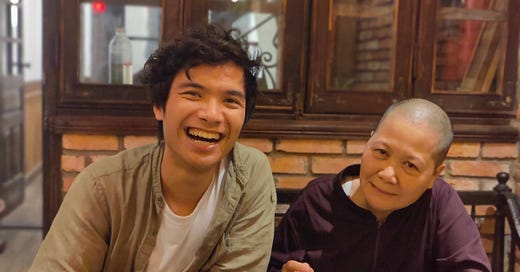I made a major mistake last night.
It was my birthday, and someone I care about gave me a gift - a thoughtful one she’d clearly put effort into.
When she offered it to me, I said casually I’d get it later, after an important conversation we planned to have later in the day.
I thought it was fine. No big deal.
Her face and tone told a different story.
She was hurt. Pissed off. I had rejected not just the gift, but her effort. Her thoughtfulness. Her care.
In my head, I was just being practical. In her experience, I was dismissing something that mattered.
This gap - between what we think we’re communicating and what others actually receive - this is where most relational pain happens.
It’s brutal when you realize it.
Another example:
For years, I never felt deeply connected to my mom. We spoke different languages of love. She was all about acts of service and gifts. I needed words, quality time.
Then one day when she already became a nun, she told me on the phone something that floored me.
Every day in the monastery kitchen, cooking hundreds of servings for others, she would think of me.
She’d send me good energy, wishing me well with each meal she prepared.
She’d been doing this for years.
I was moved to tears when she told me. You can never fathom a woman’s love, esp when it’s your mom.
But also frustrated.
How the f was I supposed to know this until she said it? I don’t feel this “telepathic bond” with her…
All that love was invisible to me until she made it visible through words, in person.

The truth is painfully simple: what we do matters, and so does how others perceive what we do.
In business and relationships, this principle is unavoidable.
You can work your ass off, but if the right people don’t see it, it might as well not have happened. (this is the root of all the office politics, as well as business marketing that doesn't work)
It’s not enough to love someone. They need to feel loved in ways they can recognize.
It’s not enough to work hard. Your efforts need visibility.
It’s not enough to care. Your caring must be expressed in languages others understand.
It's not what I say. It's what you hear.
This isn’t some manipulative game about approval-seeking. It’s about translation.
You can speak beautiful poetry in French, but it won’t move someone who only understands Mandarin. (unless you have really expressive facial, but even that)
People walk around with different dictionaries for what constitutes care, respect, love, and effort.
I’m learning slowly and painfully that the most important communication skill isn’t speaking clearly - it’s translating constantly.
Translating your intentions into languages and actions others can receive. Translating your care into forms others can recognize. Translating your appreciation into expressions (words, gift, time, thoughtfulness) so others can feel.
We’re all just trying to be seen, heard, and valued. But we’re looking through different windows, listening through different filters.
And that’s where the work is. In the translation. In making the invisible visible.
Also, next time someone offers you a gift - especially one that comes from the heart - take it. Right then. With gratitude.
Even if you don’t yet understand what the gift is really about.
Because that gift represents more than the object. As the poet David Whyte once wrote, it represents their way of saying “I know you. I see you, and I give thank to you”.
And if there’s anything worth acknowledging in this world, it’s that.
With all my love,
Khuyen
ps: do write back, I respond to every msg!
Found this newsletter useful? Please forward it to friends here: The Wholehearted Newsletter.



